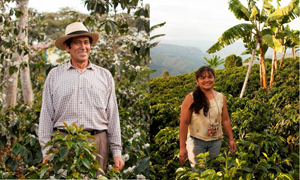Transforming a long tradition of coffee in Santander
For Juan Carlos in Socorro, Santander, coffee farming has been a way of life for generations. Santander was one of the first regions in Colombia to produce coffee commercially in the 19th century.
“Growing up working with coffee, we know we must strive for quality. Because coffee that is sold improves our quality of life. It’s a message that was passed on to us from our parents when we were children, coffee is our culture. Without coffee, there is no other life for us,” he says.
Juan Carlos is proud of himself and his community for producing some of Colombia’s finest hand picked coffee. At some 1,600 metres above sea level, Socorro has a very dry and warm climate, and coffee has been traditionally grown beneath a canopy of shade trees that maintain the biodiversity of the region. “Our coffee landscape is healthy and holds a lot of life. The coffee we grow is organised around other crops such as banana, yucca, tangerines and oranges. They serve to feed our family and the people who help on the farm.”
Developing on farm best practices to create shared values
While producing quality coffee has always been important, it is especially since Juan Carlos began working with Nespresso that improvements became most noticeable. Since he first acquired Rovira farm some 15 years ago, it has doubled in size to 6 hectares, with 30,000 coffee plants.
 “We started paying more attention to things on the farm. Keeping things organised, disposing of rubbish properly. Through the Nespresso AAA Sustainable Quality™ Program and Rainforest Alliance certification process, we have become more productive. For instance, we have learned how to base the amount and kind of fertiliser on proper soil analysis, which saves us money and also helps the environment. The premium we receive is also motivation for us to continuously improve the quality of our beans.”
“We started paying more attention to things on the farm. Keeping things organised, disposing of rubbish properly. Through the Nespresso AAA Sustainable Quality™ Program and Rainforest Alliance certification process, we have become more productive. For instance, we have learned how to base the amount and kind of fertiliser on proper soil analysis, which saves us money and also helps the environment. The premium we receive is also motivation for us to continuously improve the quality of our beans.”
Juan Carlos also notes how the focus on producing highest quality coffee has informed his approach to coffee farming in general. “Our parents passed on to us their knowledge about coffee, but as the younger generation we have started to look at it differently. We are transforming our coffee farm into a coffee business. And our business is to produce the best coffee in the world.”
Improving quality of coffee and quality of life in Cauca
Further south near the equator, Olga Lucía Otero in Inzá, Cauca, took a slightly different route to coffee, which is her livelihood today. “Before I started growing coffee, I only knew it in the cup. My family had an ice cream parlour where we sold coffee, juice and red wine. It was only when I met my husband 22 years ago, that the whole world of coffee was opened up to me,” she explains.


 “We started paying more attention to things on the farm. Keeping things organised, disposing of rubbish properly. Through the Nespresso AAA Sustainable Quality™ Program and Rainforest Alliance certification process, we have become more productive. For instance, we have learned how to base the amount and kind of fertiliser on proper soil analysis, which saves us money and also helps the environment. The premium we receive is also motivation for us to continuously improve the quality of our beans.”
“We started paying more attention to things on the farm. Keeping things organised, disposing of rubbish properly. Through the Nespresso AAA Sustainable Quality™ Program and Rainforest Alliance certification process, we have become more productive. For instance, we have learned how to base the amount and kind of fertiliser on proper soil analysis, which saves us money and also helps the environment. The premium we receive is also motivation for us to continuously improve the quality of our beans.” Olga Lucía notes that even for seasoned coffee farmers like her husband, the AAA Program has provided the means to improve the productivity and overall quality of their farm.
Olga Lucía notes that even for seasoned coffee farmers like her husband, the AAA Program has provided the means to improve the productivity and overall quality of their farm.